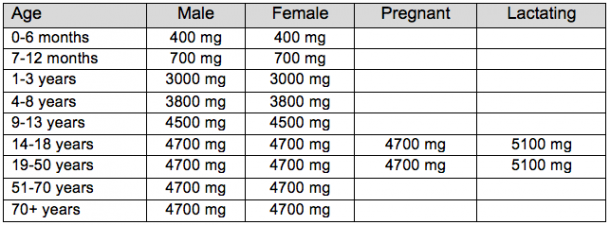 Potassium is the key electrolyte inside cells, and works with sodium to keep body fluids in balance.
Potassium is the key electrolyte inside cells, and works with sodium to keep body fluids in balance.
In addition to its role as an electrolyte, potassium is a component of bones, and is involved with muscle contraction, protein synthesis, acid-base balance and the electrical signals in the heart.
High dietary potassium intake, typically from vegetables and fruit, is associated with reduced risk for stroke and hypertension.
The intake recommendations for potassium are given as Adequate Intake. Diet surveys show that most people do not consume even the Adequate Intake of potassium, due to low intake of vegetables and fruits, which are the best dietary source of this mineral.
Recommended Dietary Allowances for Potassium
 Source: Food and Nutrition Board, Institute of Medicine, National Academies
Source: Food and Nutrition Board, Institute of Medicine, National Academies
Which Foods Have Potassium?
White beans
Canned tomato sauce and paste
Potatoes
Lima beans
Plantains
Soybeans, cooked
Refried beans
Chestnuts
Halibut
Pinto beans
Spinach
Lentils
Kidney beans
Split peas
Prune juice
Dates
Raisins
Prunes
Sweet potato
Papaya
Banana
Clams
Yogurt
Tomatoes, fresh raw
Beets
Pumpkin
Brussel sprouts
Winter squash
Artichokes
Garbanzo beans
Broccoli
Tuna, fresh
Tangerine juice
Cantaloupe melon
Cucumber
Collard greens
Milk
Swordfish
Cod
Kale
Black eyed peas
Apricots
Peaches
Plums
Honeydew melon
Grapefruit juice
Sugar snap peas
Carrots
Mangos
Oranges
grapefruit
Whole grains and the flours made from them, are high in potassium, including buckwheat flour, oat bran, barley, oats, and whole wheat flour.
What Happens If You Don’t Get Enough Potassium?
Deficiency of potassium, resulting in low blood levels, is usually caused by loss of potassium, such as from vomiting, kidney disease and some diuretics. Some eating disorder behaviors, like laxative abuse and anorexia can also cause potassium deficiency.
Medical problems like ulcerative colitis and Crohn’s disease may impair potassium absorption, leading to low blood levels. Symptoms include cramps, muscle weakness, bloating, constipation, abnormal heart rhythms and fatigue.
Potassium intake is associated with several major diseases. People with low dietary potassium intake are more at risk for stroke and high blood pressure. Increasing intake of potassium from fruits and vegetables can lower blood pressure.
Low potassium intake is linked to development of kidney stones and lower bone mineral density and risk for osteoporosis. However, none of these diseases have been characterized as symptoms of potassium deficiency.


 Are you ready to look better, feel more energized, and get back that youthful feeling you remember having as a kid? I can help you on a journey that will change the way you eat — for good. My
Are you ready to look better, feel more energized, and get back that youthful feeling you remember having as a kid? I can help you on a journey that will change the way you eat — for good. My 














 As a healthy cooking expert, health coach and TV host,
As a healthy cooking expert, health coach and TV host, 



Speak Your Mind